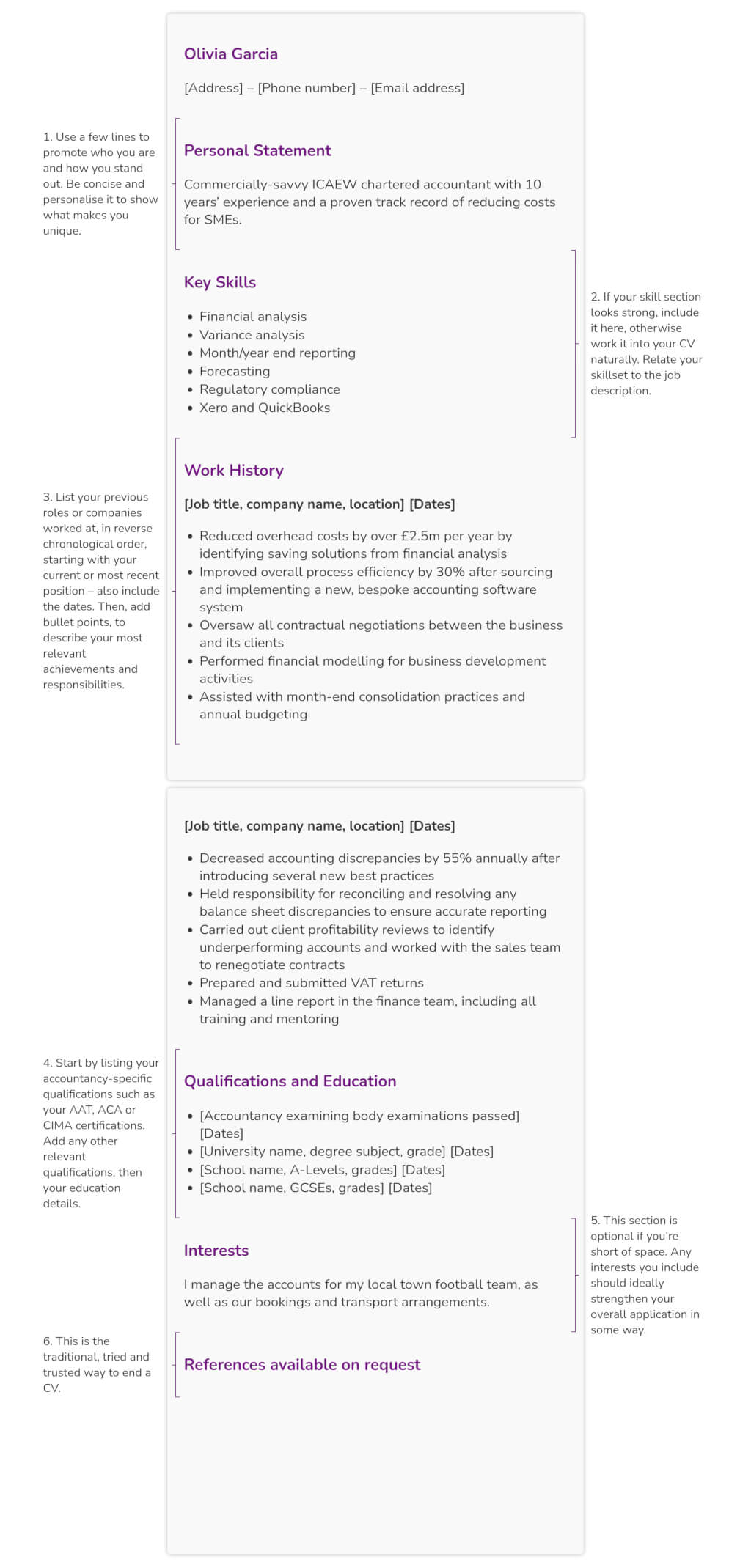Not sure how to write an accounting CV that stands out? You’ve come to the right place!
In this blog, we’ll run through our dos and don’ts for writing an effective accountant CV that shows off your achievements so far.
And if you’re looking for accounting CV examples, good news – we’ve also created a template for you!
Accountancy skills are highly sought after, so good recruits are always in demand. This means that accountants are often in a strong position to negotiate the perks they want – for example, 61% want the option of home or remote working according to the ICAEW.
However, competition is fierce for the best jobs – so you must make sure your CV gives you the best chance of an interview.
Here are our top tips for creating an accounting CV that will help you stand out from the crowd.
Accounting CV essentials
First things first, an accountant CV is like any other in that you need to get the basics right.
Whether it’s a trainee accountant CV, or one to promote a 20-year career, there are a few essentials – use a clear layout, avoid complicated formatting and send it as a PDF.
You need to tailor your accounting CV to each role you apply for, based on the job advert.
Check out our comprehensive guide to writing a CV for you, plus our tips for outstanding headlines and the perfect CV ending.
Don’t make any rookie errors either. That means no spelling or grammar mistakes, silly email addresses, keyword stuffing or anything else that will see your CV go straight to the bin!
Accountants have a reputation for strong attention to detail – your CV is the first example of your work that hiring managers will see, so don’t give them any impression you’re not thorough.
Including skills on your accounting CV
All accountant job adverts will mention a mix of desirable hard and soft skills for the role.
Including a key skills section is a quick, simple way to show hiring managers that you have what it takes to do the job.
It will also help make sure your accounting CV bypasses any applicant tracking system (ATS) software – used by 99% of Fortune 500 companies, it rejects up to 75% of CVs.
Typical accountancy skills mentioned on job descriptions may feature some of the following:
- Bookkeeping
- Tax planning
- HMRC submissions
- Forecasting
- Month/year end reporting
- Budget administration
- Payroll oversight
- Financial analysis
- Regulatory compliance
- Xero and QuickBooks
Some of your skills will be more relevant to include than others, so tailor your skillset to the job description.
Always remember though, you should never lie – especially on an accountant CV – as you will be found out, so don’t include any skills that you don’t actually have.
Using facts and figures
In some careers, it’s hard for applicants to find stats to use on their CV to show how much impact they’ve had.
In accounting, it should be more straightforward – so make the most of the facts and figures you have at your fingertips!
Mention how many staff you’ve been responsible for, how many client accounts you’ve managed and so on.
You can also include examples of how much you’ve helped a company to grow or save, in pounds or percentages.
Facts and figures will have more impact in the right context though. If you’re struggling to explain your best ones, use the STAR method – make sure you’ve covered the:
- Situation: This should be clear from the company or job role
- Task: Outline the problem you needed to solve
- Action: Be precise about what you did to address the issue
- Result: Share the outcomes of your actions, using statistics
Strong CVs feature plenty of evidence to back up claims, otherwise they risk sounding too generic and employers struggle to see how candidates stand out.
Writing an accounting personal statement with personality
Use your personal statement, also known as a professional profile, to really sell yourself.
Your personal statement should summarise the best bits of your accounting CV. Think of it as your written elevator pitch to boldly outline why you’re a great fit for the job and draw attention to your biggest strengths.
If it’s the most difficult part of your CV to write, don’t worry. Set aside extra time, plan what you want to say and don’t rush it.
Strengthen your accounting CV – add a cover letter
As we mentioned at the start, accountancy skills are in high demand, but the best opportunities will be very competitive.
A good way to give your application the edge is to write a great cover letter alongside your accounting CV. That way, you have another opportunity to explain just why you’re the right person for the job.
We recommend writing a cover letter even if the employer doesn’t ask for one – for many hiring managers, this document is just as important as the CV.
Your cover letter shouldn’t just repeat all the same information though.
This format allows you to do things a little differently. For instance, in a letter, it’s easier to convey your enthusiasm for the job opportunity and give more detailed STAR examples.
Read our guide to writing a brilliant cover letter here.
Accountant CV template

Summary: how to create a stand-out accountant CV
To write a strong accounting CV, make sure you’ve tailored it to the job description. Include all your relevant financial skills and use statistics to provide evidence for your best career achievements.
Your personal statement is a chance to tell your unique story and highlight your CV’s best bits. Write a cover letter too – it’s a great way to stand out from other applicants.
Don’t forget, if you need any help, we’re experts at writing CVs – including accountant CVs – and cover letters, so please don’t hesitate to contact us for more details.


